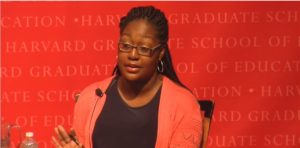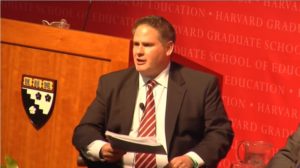There’s a good deal of evidence that Massachusetts students would be better off if their state’s urban charter schools were allowed to expand.
That was reinforced yesterday by a new report from Harvard University’s Center for Education Policy Research.
But the ballot initiative that would lift the cap on the number of charters in the Bay State may succeed or fail regardless of what the evidence says.
This week, during a forum at Harvard, parents weighed in on both sides of the debate. These excerpts from their comments, lightly edited for length and clarity, illustrate the political divide over what is known as “Question 2” — and the national debate over school choice.

First, LaTasha Sarpy, a charter school parent and associate professor at Bunker Hill Community College:
I am a product of two great district schools. I have the privilege of teaching at the largest and most diverse community college in Massachusetts.
Every day, I realize the obstacles that my students have faced just to walk through the door. Each semester, I reassure them that they made the right decision to enroll in college.
I tell them this because the only guaranteed way I know to change a person’s social mobility in life is through education.
However, as my students begin to develop their sociological imagination, they become angry.
They begin to realize that education, like other social institutions, is stratified based on race, income, gender and ZIP codes.
My students become angry when they realize that their educational experiences are based on their social locations. They become angry when they realize they didn’t have a choice.
I’m angry as well. I’m angry at the fact that 90 percent of my students enter college testing into developmental math. At the lowest level, students are currently learning long division.
The reality is that many of these students have graduated from high school with the assumption that they are college-ready, only to waste time and money taking classes that do not count toward their degree.
Question 2 asks whether charter schools should be able to create 12 new schools a year, or to expand enrollment in current charters in Massachusetts.
I am in full support, because I am tired of being angry.
You may have heard both sides of the argument about the number of students being served that represent special subgroups, the comparable disciplinary rates, and of course, the funding.
But this debate is not about any of those things. This debate is about choice.
We can argue back and forth, but both charter and district schools have strengths and challenges. But we also know that some districts have had a long history of dealing with — and not being able to fix — those challenges.
In fact, 20 years ago, my mother faced these problems that we’re discussing today. She had to make tough decisions about which educational environment would be best for me.
I am so grateful for those tough and demanding conditions, the long bus rides, and sometimes, tearful nights that I spent in another district because of the disparity between my ZIP code and another town’s.
But then I become angry again, thinking about how, two decades later, I am still in the fight, but now, as a parent.
Michael Robinson, a former charter parent from Mansfield, Mass.:

I am here to represent the small population of children who have too silent a voice in the charter school debate. Children with disabilities who are undeserved in the conference rooms and marbled hallways where decisions are made by those who look at averages that determine educational policy.
I’m here because I have a moral obligation to inform others and prevent other trusting parents — and voters — from repeating our mistake.
When we entered the charter lottery, it was because of the lack of early education funding. Our school only had half-day kindergarten, and the charter offered a full day. When my daughter was selected, we signed her up, along with my son, who was entering second grade. We were warned by many of our teacher friends that charter schools can be harmful to children with disabilities, but we assumed they were just angry that the charter schools were taking money away from their district.
We should have listened. While, on paper, charters are obligated to provide special education services, they are not incentivized to do so. Even though [Individuals with Disabilities Education Act] affords each child a free and appropriate public education, many of these independent schools see special education as a resource-intensive pit, which depletes funds that they would prefer to spend elsewhere.
…
If you speak to enough parents, you might observe there’s a common formula which many charters use against kids with disabilities, making conditions unbearable so the family withdraws. Our family experienced these tactics firsthand. Teachers modeling humiliation and social alienation, illegal use of restraints, punishment as a lever, and suspension as a trap door. Gross under-staffing of special education. Ignorance and avoidance of special-ed law. Punitive measures against staff who voiced recommendations for supports. The list goes on.
…
Looking back, I don’t know why we fought as long as we did to keep our kid in that school, but in the end we realized it was too harmful. Today, both children are still recovering. Our daughter was particularly traumatized, and she spent nearly a year at a therapeutic day school, where she rebuilt her trust and confidence so she could return to a general education setting.Our experience with the home district has been in sharp contrast. Our kids have flourished. The administration, the teachers, the staff have been true partners, full of compassion and commitment. And they have helped our children tremendously.
…
I oppose Question 2 because the current charter model is dangerous, without implementing permanent oversight and controls that ensure accountability to parents, to the community, and to the children. Policies must be enacted to ensure charter schools are in compliance with special education, and ongoing monitoring and bidirectional communication with parents must be in place to protect rights and prevent trauma.We need to understand how charter schools fit into a larger education vision that supports all children in this state.
Marc Kenen of the Massachusetts Charter Public School Association said his heart went out to Robinson’s daughter, but her trauma was “not the common experience” among students with special needs in charter schools.
Meanwhile, Tito Jackson, a Boston city councilman opposed to the referendum, raised other issues — like the fact that charter school students rely on the district to provide transportation.
As charter schools and other options grow, states need to look at these systemic questions. Do children with special needs have access to schools that serve them well — inclusive environments if they want them, or specialized providers, including special needs-focused charters, if those work better? Do districts help students overcome the barriers to true school choice?



Leading up to Nov.r 8, as you view or listen to the slick “YES on 2” spots & robo-calls, think about this:
Can anyone provide JUST ONE PAST EXAMPLE where these out-of-state folks backing Question 2 — the Walmart’s Walton family, L.A. mogul Eli Broad, Wall St. hedge funds — have poured in $21.7 million to something … no strings attached, no expectations of monetary return?
That $21.7 figure is here:
https://deutsch29.wordpress.com/2016/10/05/ma-question-2-funding-hits-21-7-million/
If, as Question 2 backers clim, the most ruthless capitalists ever dropped $21.7 to pass 2 because they care so much about kids’ education —
… and not about their profiting from the privatizing public schools thru the expansion of privately-run charter schools,
… then I’m sure you could google and find a past example where they have done something similar .. .again out of generosity… with no strings attached, no expectation of monetary return…
Something like …
“Well, you know back in 2000-something / 1900-something, these guys put $20 million to the (INSERT CHARITABLE CAUSE) Here’s the link that proves this.”
No, I didn’t think so.
So the question is:
To whom do Massachusetts schools belong?
The citizens & parents who pay the taxes?
… or …
… oney-motivated out-of-state billionaires & Wall St. folks out to buy control of Mass. schools via Question 2, and then profit from that control?
If you believe the former, THEN VOTE “NO” ON QUESTION 2.
Tell those out-of-state profiteers:
Massachusetts public schools are NOT FOR SALE!!!
Try the John Oliver charter school video:
https://www.youtube.com/watch?v=l_htSPGAY7I
Listen to this dissection of a “YES on 2” radio ad:
https://wrsi.com/monte/dissecting-the-great-schools-massachusetts-ad-on-question-2/
You make some interesting points, Jack, but it’s worth keeping in mind that the out-of-state money argument applies to both sides here.
https://www.the74million.org/article/analysis-teachers-unions-decry-outside-money-in-politics-but-theyre-the-source-of-a-lot-of-it
Also, it makes sense that the national charter school movement would focus on Massachusetts because it’s a place where charters – especially urban charters – are clearly getting good results. That can’t be said everywhere. https://nextstepsblog.org/2016/09/massachusetts-charter-schools-evidence-and-school-choice-politics/